Poor Little Rich Haiti to Be Fleeced of Copper-Silver-Gold Via Caracol Deep-Water Port
By Dady Chery
Haiti Chery
Show me a corporate boss who calls Haiti the “poorest country in the western hemisphere,” and I’ll show you a con artist preparing to fleece Haiti. Likewise, show me a western technocrat who bemoans Haiti’s “dramatic deforestation due to charcoal production” and I’ll show a bio-pirate or vandal preparing to wreck Haiti’s remaining cloud-forest and mangrove-forest ecosystems.
It turns out that the real plan for Haiti’s northeastern region, especially the Caracol Bay area, is one that was hatched by Canadian mining corporations, with the United States and South Korean sweatshop zone being a side project and distraction. If this mining plan is given a green light while Haiti is under foreign occupation, it will permanently strip the country of much of its mineral, cultural, and ecological wealth.

Dominican Republic Pueblo Viejo mine on August 7, 2009; one would be hard put to find deforestation due to charcoal production that looks quite as bad as this (Credit: Mining Journal).
In an interview with Canada’s Financial Post, Majescor Resources Inc. CEO Dan Hachey was effusive about Michel Martelly’s installment as president because he expects Martelly’s policy of mimicking the Dominican Republic (DR) to be a boon to the mining sector.
Hachey enthusiastically noted that,
“thirty years ago, there was no mining sector to speak of in the Dominican Republic….
“In that short period of time they’ve seen the development of the Pueblo Viejo Project [of Barrick and Goldcorp], which is one of the world’s largest gold deposits — and is pretty much a neighbour of ours.
“They’re going to be coming on with production this year.”
This glowing picture omits the fact that Barrick and Goldcorp have come under strong popular opposition in the DR. In a country where 20 percent of the population lacks access to drinking water, these companies are accused of polluting 2,500 cubic meters (660,000 gallons) of water per hour with the vast quantities of cyanide needed to process 24,000 tons of ore a day by opencast, or open-pit, mining. Open-pit mining is banned by the European Union. Activists in the DR have joined forces with a broader group called Observatorio de Conflictos Mineros de América Latina (OCMAL) that has launched a campaign to end this practice in the region.
There is great concern that the DR’s biggest water reservoir, which is close to the mining operations, is continuously at risk of cyanide contamination, since stories of spills and massive fish die offs caused by mining companies are legion. Barrick and Goldcorp have also been accused of dynamiting mountains and destroying Taino Indian archaelogical sites.
Like the Pueblo Viejo region of the DR currently under exploitation, the spot being eyed for mining by Majescor in Haiti, a 50-square-kilometer area called the SOMINE property, is part of broader region, replete with archeological sites, situated along a metal-rich mountain ridge running from southeast DR to northern Haiti. This was formerly known simply as the Massif du Nord, but it has become the Massif du Nord Metallogenic (or Mineralization) Belt.

An EMX-Newmont joint venture and the Haitian government signed a memorandum of understanding in April 2012 that allows exploration drilling while a mining convention is being ratified to permit development. Under the MOU, the Savane La Place gold prospect is the first project selected for drilling. EMX is the Canadian company Eurasian Minerals, Limited,
http://www.eurasianminerals.com/new/Haiti.asp
SOMINE is an acronym for Société Minière du Nord-Est S.A. and is described in the mineral trade sheets as a “Haitian affiliate mining company.” It is 66.4 percent owned by Majescor, with the rest being owned by Haiti’s elite. Majescor is still a relatively small company that conducts mineral surveys.
The SOMINE property is surrounded by other mining properties owned jointly by Majescor and much larger concerns like Eurasian Minerals and Newmont Mining. Once Majescor’s surveys are complete, it plans to find a big partner, like Eurasian, Newmont, or Barrick, or some partnership of these like EMX-Newmont, to handle the extractive part of the project.
Curiously, the area of the SOMINE property was initially surveyed as early as
“the 1970s by the UN Development Program, with some very good results [but the project was not pursued, then] there was a feasibility study done by the Germans [Bundesanstalt fur Geowissenschaften und Rohstoffe (BGR)] in 1980, and there was further drilling done in the 1990s by Canadian junior [mining companies].”
recalled Hachey.
During the 1980’s, the area was explored again by the United Nations Development Programme (UNDP) and also surveyed by the French Bureau de Recherches Géologiques et Minière (BRGM), both of which reported finding only copper.
The official story is that an abundance of copper had until 2012 obscured the fact that the area’s ore is also rich in silver and gold, and this was discovered from Majescor’s recent prospects of Douvray, Blondin and Faille-B. However, the story could just as well be that the mining executives were biding their time and waiting for a “stable” non-nationalistic government to take effect before initiating their projects.
The mineral rights to the area were assigned to SOMINE under a Mining Convention executed on May 5, 2005, and valid until March 9, 2020, between this company and the post-Aristide coup government. After this, it did not take long for Haiti’s mountains to start to glitter. For example, an exploration of the Faille-B prospect in 2007 found a gold vein that averaged 42.7 grams of gold per ton of ore (g/t) over 6 meters, including values of 107.5 g/t of gold over one meter.
According to Hachey, April 11, 2012 assays from Blondin found:
- 0.45% copper over 96.5 meters;
- 0.3% copper over 12 meters, including 0.61% copper over 1.5 meters; 154 grams of silver per ton (g/t) over 12 meters, including 869 g/t silver over 1.5 meters.
March 13, 2012 results from Blondin discovered:
- 72.4 g/t silver over 15 meters;
- 16.9 g/t silver over 113 meters, including 6.2 g/t silver over 1.5 meters; 0.43% copper over 113 meters, including 4.44% copper over 1.5 meters.
February 1, 2012 results from Douvray discovered:
- 255 g/t silver over 13.5 meters, including 2,069 g/t silver over 1.5 meters; 0.35% copper over 13.5 meters, including 0.52% copper over 1.5 meters; 0.02 g/t gold over 13.5 meters, including 0.04 g/t gold over 1.5 meters;
- 277 g/t silver over 13.5 meters, including 1,428 g/t silver over 1.5 meters; 0.18% copper over 13.5 meters, including 0.52% copper over 1.5 meters; 0.04 g/t gold over 13.5 meters, including 0.04 g/t gold over 1.5 meters.
These highly concentrated deposits of copper, silver and gold should reasonably represent a newfound wealth for Haiti at a time of dire need of resources for the country’s reconstruction. But if the DR is to serve as an example, Haiti will not benefit from its minerals. In the DR, Barrick owns 60 percent of the Pueblo Viejo gold mine and Goldcorp Inc. owns the remaining 40 percent. To get a sense of the scale of the greed, one need only consider that the Pueblo Viejo mine is slated to produce one million ounces of gold per year at a cost of only $20 to $50 per ounce, making it one of the lowest-cost gold mines in the world.
Hachey comments with evident enthusiasm,
“What we’re most excited about is that we found some silver which was never really realized before. It’s the first silver discovery in Haiti.
“Part of the reason why it was never really discovered was that historically there was so much copper prevalent — there’s a lot of outcropping at surface. The people who did the work before did not do much testing, even for gold.
“The geology is a little complex for a copper porphyry, but in a good way. The surprises that we’re getting are all good ones.”
As major draws for a big mining partner to this next phase of the project, Hachey is advertising that, unlike Port-au-Prince, which was destroyed by the earthquake, Cap Haitien is a pleasant place for a Canadian mining executive and his family to come to. In addition he notes that there are plans for
“the construction of a deep-water port at Caracol,”
only 15 kilometers from the SOMINE property and near Cap-Haïtien.
This first official announcement of a deep-water port for Caracol explains in part why there has been no effort to mitigate the ecological effects of the massive free-trade, i.e. sweatshop, zone inaugurated in March 2012 in that area: the textile factories’ contributions to the degradation of Caracol Bay should be trivial compared to the damage from opencast gold mining and construction of a deep-water port.
UPDATES:
UPDATE #1, May 7, 2012 (Le Matin): Martelly announces that the construction of a port will soon start in Fort-Liberté, near Caracol, in the Northeast. The port will cost $179 million and is supposed to be “built with the U.S. government’s help,” but it will likely be entirely owned by U.S. concerns.
UPDATE #2, December 21, 2012 (Associated Press) and December 28, 2012, VCS Mining: Under cover of the holidays, Haiti’s Mining Director, Ludner Remarais, issued a gold exploitation permit to VCS Mining LLC, and its wholly-owned subsidiary Delta Société Minière S.A., a U.S. company based in North Carolina, and gold and copper exploitation permits to SOMINE S.A. SOMINE is 66.4 percent owned by Canada’s Majescor Resources Inc. and 33.6 percent owned by a group of unidentified, and possibly nonexistent, Haitian investors. According to Majescor CEO Dan Hachey: The permit “allows us to finally produce and make money, at least get to that step…. It’s also a great step forward for the mining industry in Haiti.” SOMINE engineer Michel Lamarre said he expects exploration to start in 36 to 42 months, and VCS CEO Angelo Viard expects his company to enter into “production” within 29 to 38 months. The gold permits are for five years and renewable for up to 25 years, with a possible renewal for another 10 years if new resources are discovered. These permits were issued by Remarais without any environmental-impact assessment (EIA).
UPDATE #3, January 24, 2013 (Defend Haiti): After a meeting of Haiti’s Senate Committee on Public Works and Communication with the Minister of Public Works, Transportation and Communication, Jacques Rousseau, and the Director General of Mining and Energy, Ludner Remarais, on Tuesday January 22, 2013, the Senate met and rejected the agreements made by Remarais with the U.S. and Canadian mining companies in December 2012, pending a review of the companies and the agreements.
UPDATE #4, April 10, 2014 (Miami Herald): Plans to dig a deep-sea port in Fort-Liberté, near Haiti’s Caracol Bay area, have been scrapped. If the plans had gone ahead, they would have destroyed a rare hotspot of biodiversity in the Caribbean with Haiti’s largest remaining mangroves and such a breathtaking variety of corals that the area had been slated to become a World Heritage Site and marine park. Apparently the controversy around the project discouraged potential investors. Instead of destroying Fort Liberté Bay, the existing port in Cap Haitien will be expanded despite currently operating at ten-fold under capacity.
UPDATE #5, March 5, 2015 (Breitbart): The teaser to a new book titled Clinton Cash: The Untold Story of How and Why Foreign Governments and Businesses Helped Make Bill and Hillary Rich, by Peter Schweitzer, reveals that Hillary Clinton’s brother, Tony Rodham, as well as former Haitian Prime Minister, Jean Max Bellerive, sat on the board of VCS Mining when it was granted its mining permit without an EIA, under cover of Christmas 2012.
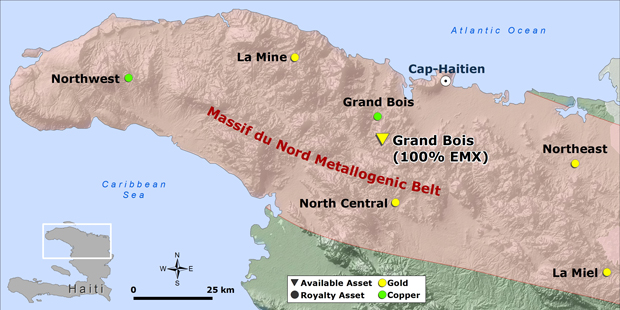 UPDATE #6, November 10, 2015 (Eurasian Minerals: http://www.eurasianminerals.com/s/haiti.asp). Under cover of the Haitian presidential elections, the US began to consolidate its mining interests in Haiti. The Vancouver-based Canadian company, Eurasian Minerals Inc. (EMX) announced, on November 2, 2015, that it sold to the Colorado-based US mining company, Newmont Ventures Limited, all their joint-venture interests. Eurasian received $4 million (CAD $ 5.3 million) in cash from Newmont for the deal, along with a 0.5 percent net smelter return (NSR) royalty on 45 of the permit applications Eurasian had gotten in the area. Eurasian will continue to control 100 percent of the Grand Bois gold-copper project in Haiti.
UPDATE #6, November 10, 2015 (Eurasian Minerals: http://www.eurasianminerals.com/s/haiti.asp). Under cover of the Haitian presidential elections, the US began to consolidate its mining interests in Haiti. The Vancouver-based Canadian company, Eurasian Minerals Inc. (EMX) announced, on November 2, 2015, that it sold to the Colorado-based US mining company, Newmont Ventures Limited, all their joint-venture interests. Eurasian received $4 million (CAD $ 5.3 million) in cash from Newmont for the deal, along with a 0.5 percent net smelter return (NSR) royalty on 45 of the permit applications Eurasian had gotten in the area. Eurasian will continue to control 100 percent of the Grand Bois gold-copper project in Haiti.
Sources: Haiti Chery | News Junkie Post | Black Agenda Report | San Francisco Bay View | Tortilla con Sal | Haiti Land of Freedom | OpEd News | Dady Chery is the author of We Have Dared to Be Free: Haiti’s Struggle Against Occupation.

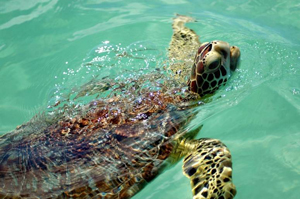



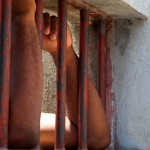
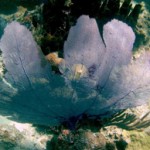

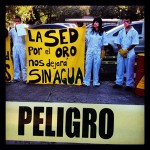
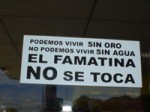
Since it is possible to mine in an eco-friendly and a heritage-conscience manner, as is done in many countries, it is up to the government to enforce regulations ensuring a mutual benefit to both the country of Haiti and the mining companies. Perhaps the author should take up his battle not against the mining companies but the appropriate government agencies. If done properly, the mining of copper and precious metals would certainly be a boon to the Haitian economy both from a labor and mining tax perspective. Hey, just my opinion.